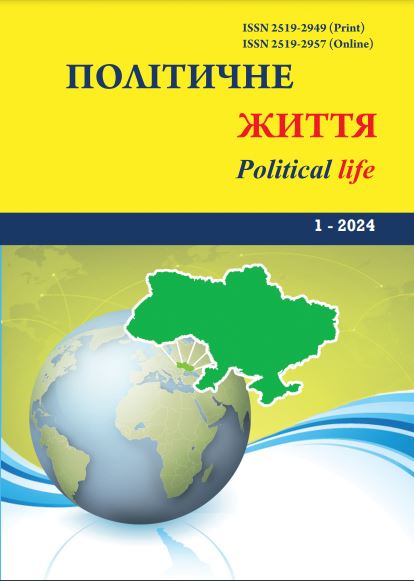Peculiarities of the institutionalization of the civil society of Ukraine in the conditions of martial law
DOI:
https://doi.org/10.31558/2519-2949.2024.1.6Keywords:
civil society; public associations; institutionalization of civil society; martial law; charitable and volunteer organizations; network public self-organizationAbstract
The article is devoted to the study of civil activities under martial law. Against the general background of the annual slow growth of the number of public associations of different orientations, the differences in the institutionalization of civil activities after the full-scale Russian military invasion on February 24, 2022 from the previous period of resistance to Russian armed aggression, which was accompanied by hostilities in the east of Ukraine, are pointed out. During these periods, the Ukrainian civil society demonstrated the ability for operational public self-organization. Re-election of part of the functions of the state, primarily in the humanitarian and social spheres, both to provide everything necessary for the Ukrainian military, and to solve the urgent problems of civilians affected by hostilities, as well as inclusive categories of the population; the appearance of new social groups (internally displaced persons, veterans of the anti-terrorist operation) caused a change in the structural and institutional design of Ukrainian civil society, an increase in the share of volunteer, charitable, other socially oriented public associations in its socio-humanitarian segment, in particular associative type and humanitarian ones created on the network principle headquarters and volunteer centers. Thanks to the synergy of the government, the public and business, with the help of foreign donors, a regional network of humanitarian, social, educational, journalistic and innovative public hubs and centers has been launched in Ukraine. Successful practices of public self-organization, state-public interaction in the conditions of war to solve the problems of various inclusive population groups will contribute to the involvement of the public sector’s capabilities in restoring and building a safe environment in communities that survived hostilities and occupation, in general, to the reconstruction of Ukraine in the post-war period.
References
Держава і громадянське суспільство в Україні: пошук концепції співпраці : аналіт. доп. / за ред. О. М. Майбороди. Київ : ІПіЕНД ім. І. Ф. Кураса НАН України, 2013. 376 с.
Політична енциклопедія / НАН України, ІПіЕНД ім. І. Ф. Кураса ; редкол.: Ю. Левенець (голова) [та ін.]. Київ : Парламентське вид-во, 2011. 807 c.
Крицкалюк Н. І. Інституціоналізація громадянського суспільства як основний критерій демократичного розвитку. Вісник Київ. нац. ун-ту ім. Тараса Шевченка. Філософія. Політологія. 2014. Вип. 1. С. 61–64.
Відбудувати Україну після війни планують 80 % громадських і благодійних організацій : опитування / Укрінформ. 2023. 21 лют. URL: http://surl.li/pqqeq (дата звернення: 05.12.2023).
Кількість зареєстрованих юридичних осіб за організаційно-правовими формами господарювання з розподілом за ознакою статі керівника / Держстат України. URL: https://ukrstat.gov.ua/edrpoy/ukr/EDRPU_2023/ks_opfg/arh_ks_opfg_23.htm (дата звернення: 12.12.2023).
Тренди розвитку громадянського суспільства 2024 / ІСАР Єднання. URL: https://ednannia.ua/news/nashi-novini/12580-trendi-rozvitku-gromadyanskogo-suspilstva-2024?utm_source= sendpulse&utm_medium=email&utm_campaign=naitskavsh-novini-konkursi-ta- (дата звернення: 19.01.2024).
Потапенко В., Двігун А. Аналіз українського волонтерства на основі методології нових соціальних рухів. Київ : НІСД, 2022. URL: https://niss.gov.ua/news/komentari-ekspertiv/analiz-ukrayinskoho-volonterstva-na-osnovi-metodolohiyi-novykh-sotsialnykh (дата звернення: 17.12.2023).

